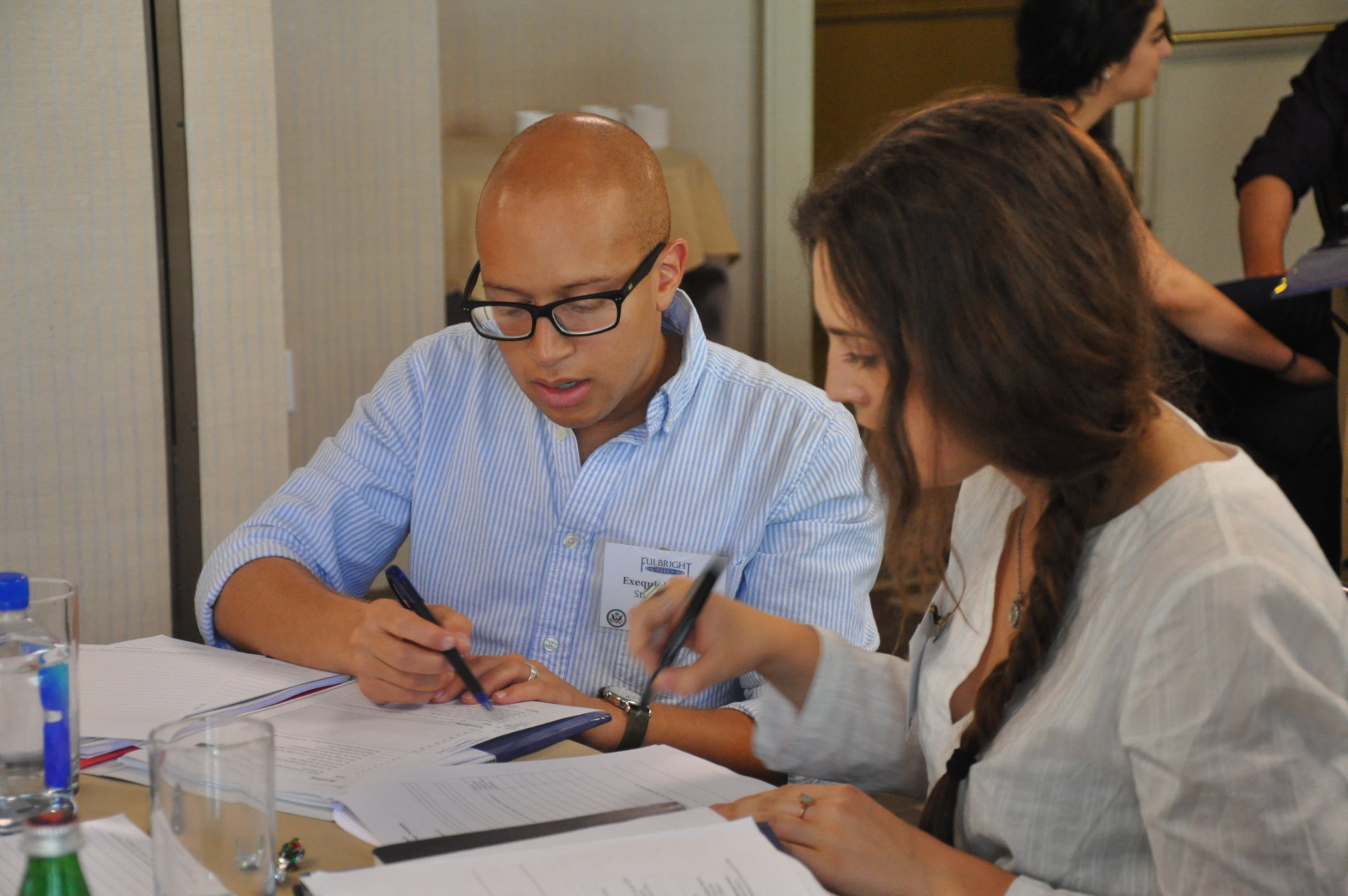
Fulbright Slovak Scholar Program offers an opportunity for Slovak scholars - lecturers and researchers, and experienced professionals to engage in full-time advanced research or/and lecturing (teaching or consultation) at college or university level in the United States, or a combination of both. A research or lecture stay may last 3 to 6 months. Applications are accepted in all fields of study, except for projects that require direct contact with patients (clinical medicine).


The living expenses are calculated based on the living costs estimated for the specific location of the host institution
international economy class airfare via the most direct route from home of the grantee to the authorized destination in the U.S.
J-1 visa sponsorship for the grantee and J-2 visa sponsorship for dependents
Dependents allowance depending on the number of dependents
One-time professional allowance
Accident and Sickness Program for Exchanges covering basic healthcare (supplemental private insurance highly recommended)
The Commission helps the grantees prepare for their stay in the U.S. while the Institute of International Education (IIE) provides on-going support over the course of the grant

Candidate must submit an online application. There is no need to send any documents to the Commission.
Application must include: CV, Project Statement, 3 Reference Letters, Invitation Letter from accredited U.S. institution.
The application form is designed for the whole Fulbright Program worldwide. Please read carefully the specific instructions for the Slovak Scholar Program to complete the application.
Watch the Q&A webinar recording that will address all your questions.
Fulbright Slovak Scholar Application Form AY 2025/26The application period is usually open from April to October. Candidates should bear in mind that they need to submit their application approximately one year prior to the start of their grant period. Deadline for submission of application for academic year 2025/2026 is October 17, 2024 (11:59 PM CET). Incomplete applications or applications received after the deadline will not be considered.
Application cycle is open.
Deadline for application submissions (exact date to be announced). Approximately one week after the deadline, applications are reviewed by the Commission whether they are complete and meet all required formalities and eligibility criteria.
Project Statements are sent for peer review.
The most qualified candidates are invited for an in-person interview (interviews may not be rescheduled). Candidates are informed of the results of the selection within five business days of the interview.
Initial administrative steps are taken. Selected candidates are notified of the official approval by the Fulbright Foreign Scholarship Board (FFSB).
Grant documents are issued. Administrative steps to process visa applications and departure for the U.S. are taken, if the grant starts in the fall semester.*
Pre-Departure Orientation is hosted by the Fulbright Commission.
Visa interviews are conducted for grantees who depart for the U.S. and start their Fulbright grant in the fall.
* If the grant starts in the spring semester, administrative steps to process visa applications and departure for the U.S. are taken between September and December, and visa interviews are conducted between December and January.
I am a Slovak citizen but I work abroad. Can I apply?
Yes, you can. However, preference may be given to candidates living and working in Slovakia
I am not a Slovak citizen but I am affiliated with a Slovak institution. Can I apply?
Foreign nationals are not eligible for Fulbright scholarship in Slovakia even though they are affiliated with a Slovak institution. If you wish to apply for a Fulbright scholarship, contact the Fulbright Commission or U.S. Embassy in your home country for more information.
Does the Fulbright Commission arrange for a leave of absence at the home institution?
It is the sole responsibility of the candidate to make sure that they are free to accept a grant and obtain any necessary leave of absence and make other required arrangements to enable them to accept a grant. The awarding of a grant does not constitute endorsement by the Board or the Commission of a leave of absence for the grantee.
Can family members travel to the U.S. with me?
Yes, if they qualify as a dependent – a spouse, or a child who is financially dependent upon a grantee and as long as any such child’s age does not exceed 21 years. The Fulbright Commission provides a monthly allowance for dependents ($200 to $400) and assists the dependents in obtaining the necessary visa (J-2 visa). The grantee needs to provide the Commission with sufficient funds confirmation that will prove they have enough funds to cover monthly maintenance. For specific amounts, please contact the Commission.
Do I need to include a TOEFL or other English language certificate with my application?
It is not a requirement for the scholar program, but you can include it, if you have one. However, language proficiency will be examined during the in-person interview.
I haven’t received my Ph.D. yet. Can I apply?
Professionals who do not hold a Ph.D. degree but have substantial professional experience (usually several years) are eligible for the scholar program. If you are currently a Ph.D. student, you may be eligible for the student program. For more information, see the details of the Fulbright Slovak Student Program on our website or contact our office for information.
Do you have any cooperation with U.S. institutions of higher education?
We do not cooperate with any specific institution. Candidates may apply to any accredited U.S. institution of higher education.
Is there an age limit for Scholar Program?
No, there is not. However, it is expected that the grantee return to their home institution and be professionally active for at least 5 more years.
Do I need to obtain an invitation letter from the U.S. host institution?
It is the sole responsibility of the candidate to obtain an invitation letter and candidates are required to upload the invitation letter in their online application.
Is a specific form for invitation letter required?
Candidates may use any form but the invitation letter should be typed on institutional letterhead and signed. The following information should also be included in the letter - name of the applicant, exact dates of proposed stay at the host institution, activities related to the proposed project, including expected outcomes of the proposed project. It is highly recommended to include facilities available to the candidate during their stay, such as access to a library, office desk etc. Information on both existing and future cooperation is desirable.
Can I change the dates of the proposed stay at the host institution after submission of my application?
Yes, the dates can be changed upon agreement with the host institution and must be approved by the Commission.
What if I need to make changes in the project outlined in my application? Am I allowed to do so?
The awarding of a grant does not necessarily imply approval of the grantee’s project in the specific terms outlined in the application. Reasonable modifications of the project may be required, and the grantee is expected to accept such modifications as the Commission deems necessary or desirable in light of local conditions. A grantee who wishes to change their project must obtain prior written approval from the Commission, which shall consult with the cooperating agency (IIE) and/or Bureau of Educational and Cultural Affairs before making a decision.
Can I reapply for the Scholar Program should I not be successful?
Candidates who were not successful are welcome to reapply when the next application cycle opens as long as they meet all eligibility criteria.
Can I be affiliated with more than one U.S institution?
Candidates may seek affiliation at two U.S. institutions, however they need to provide strong justification for that as well as two invitation letters. We recommend the candidate consider the timeline of the project and its feasibility at two different U.S. institutions.
Program, year, host institution:
Fulbright Slovak Scholar, 2018-2019, Dodge College of Film and Media Arts, Chapman University
Current position:
Assistant professor at Screenwriting Department, Film and TV Faculty of Academy of Performing Arts in Bratislava.
Testimonial:
“At first, I thought that Fulbright scholarships were awarded only in science, but this is not the case. There are no limits to creativity and I succeeded with an art project. In the U.S. I did the research on several levels. My chosen topic, American everyday life, and of myself in another culture. As a novelist and screenwriter my stay brought me a lot of impulses and inspiration for my future work.”
Fulbright Slovak Scholar, 2018-2019
Program, year, host institution:
Fulbright Slovak Scholar, 2017-2018, School of Behavioral and Brain Sciences, University of Texas at Dallas
Current position:
Assistant professor at Department of psychology and Department of psychiatry at Comenius University in Bratislava
Testimonial:
“If someone tells you that the Fulbright Scholarship is a "Life-changing experience", be sure to trust them.”
Fulbright Slovak Scholar, 2017-2018
Program, year, host institution:
Fulbright Slovak Scholar, 2017-2018, Center for Clinical Bioethics, Georgetown University
Current position:
Assistant Professor at Institute of Social Medicine and Medical Ethics, Faculty of Medicine, Comenius University in Bratislava
Testimonial:
“I had always dreamt about visiting the places where the field I love and work in had been born. I am a bioethicist and the science of bioethics has been founded in Georgetown. My Fulbright scholarship allowed me to do research in ethics of genetics, learn about new methods of medical ethics teaching and to become more familiar with clinical ethics consultation. The best and most unexpected part was that I truly became a part of the Georgetown bioethics community. But my Georgetown experience didn’t end when I left the US. I’m still in touch and collaborating with my friends and colleagues from the two bioethical centers there.”
Fulbright Slovak Scholar, 2017-2018
Program, year, host institution:
Fulbright Slovak Scholar Program, 2014-2015, Department of Political Sciences, Boston College
Current position:
Vice-rector for Science and Research, Matej Bel University
Testimonial:
“The research stay at the Boston College was both a perfect culmination of my academic and personal career- speaking about my educational and research activities in the field of political sciences and international relations as well as in exploring country whose language, people and culture have captivated me since I have first visited it. At the same time, this research stay has become an ideal next step towards my future career due to wide range of new knowledge and experience. Moreover, doing research in a completely different environment of the best world universities, resulted in my personal invigoration and a strong professional stimulation. A Fulbright program perfectly ties into much of the work that I do at Matej Bel University, but it ultimately enabled me to live in the USA with my family for some time and in this way to learn through the culture and the language.”
Fulbright Slovak Scholar, 2014-2015
Program, year, host institution:
Fulbright Slovak Scholar Program, 2006-2007, Department of Chemical Engineering and Material Science, Michigan State University
Current position:
independent researcher, The Institute for Forecasting, Centre of Social and Psychological Sciences, Slovak Academy of Sciences
Testimonial:
“Fulbright Program has changed DNA of my view on life and society. I realized that it is worthy of trying to make Slovakia a better place.”
Fulbright Slovak Scholar, 2006-2007
Program, year, host institution:
Fulbright Slovak Scholar Program, 2008-2009, Institute for the Study of International Migration, Georgetown University
Current Position:
Program Director, Bratislava Policy Institute
Testimonial:
“At Georgetown University, I lectured on migration policy and researched US approaches to migration under President George W. Bush. Though, during my stay I have had 6 lectures and seminars on the situation in Slovakia and Central Europe - at the Georgetown University, at the Johns Hopkins University, at the University of North Carolina in Chapel Hill, in the US Congress, at the Woodrow Wilson Center, and lastly at the New School University in NYC. I consider my stay at the Georgetown University to be successful and enlightening. I benefited from the results of it for many years, I published 2 publications and numerous articles. Not to mention that, at least that's how I perceive it, I managed to understand an utterly complicated migration policy of the United States and of particular states of the Union.”
Fulbright Slovak Scholar, 2008-2009